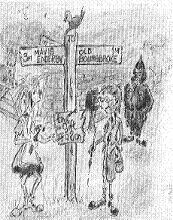I’ve continued working my through my DVDs by watching All Quiet on the Western Front, the 1979 version directed by Delbert Mann, and starring Richard Thomas.
It’s along time since I saw the original 1930 film by Lewis Milestone, but I remember being impressed, mainly by the battle scenes, not, I’m sure, what the director would have wished of me.
Being the first and one of the best (reputedly) anti-war films, it had the privilege of inventing the clichés: idealism trampled in the mud of Flanders; stupid old people banging on about honour and patriotism without the need to die for it themselves; bullies exposed as cowards and artists revealed as heroes; the idyllic pastoral interludes; first sex experienced as a taste of life before it is snuffed out; death’s random choices of victim; and the sheer filthy waste of it all.
Lew Ayres, the original 1930 star, was so affected by his role that he became a pacifist himself ten years later when ‘the bitch was in heat again’.
Aces High regurgitated all of the clichés to little effect and it needed something more than Delbert Mann and Richard Thomas possess to make this old warhorse come alive again. It doesn’t say much for this film’s impact that I merely laughed to see Thomas hoisting Ernest Borgnine, of all people, on his back and carrying him back from the front line.
That was when war did indeed become hell.
It’s along time since I saw the original 1930 film by Lewis Milestone, but I remember being impressed, mainly by the battle scenes, not, I’m sure, what the director would have wished of me.
Being the first and one of the best (reputedly) anti-war films, it had the privilege of inventing the clichés: idealism trampled in the mud of Flanders; stupid old people banging on about honour and patriotism without the need to die for it themselves; bullies exposed as cowards and artists revealed as heroes; the idyllic pastoral interludes; first sex experienced as a taste of life before it is snuffed out; death’s random choices of victim; and the sheer filthy waste of it all.
Lew Ayres, the original 1930 star, was so affected by his role that he became a pacifist himself ten years later when ‘the bitch was in heat again’.
Aces High regurgitated all of the clichés to little effect and it needed something more than Delbert Mann and Richard Thomas possess to make this old warhorse come alive again. It doesn’t say much for this film’s impact that I merely laughed to see Thomas hoisting Ernest Borgnine, of all people, on his back and carrying him back from the front line.
That was when war did indeed become hell.





